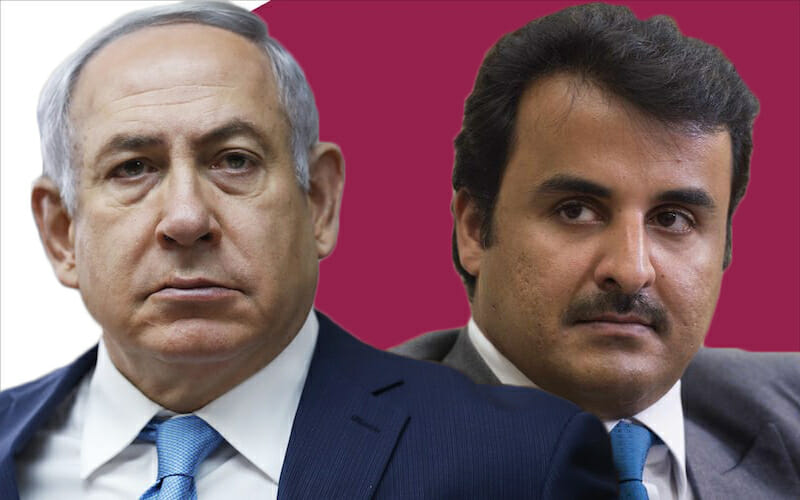
Washington’s Interest in Qatari-Israeli Relations
On March 16, Israel’s Regional Cooperation Minister Tzachi Hanegbi said that Qatar was “endeavoring hugely to ensure its aid” to Gaza “does not end up as any Hamas force build-up.” Hanegbi stated that Israel supervises and approves Doha’s reconstruction efforts, adding that he engages with Qatar’s envoy to Gaza Mohammed al-Emadi in order to expand diplomatic relations. On July 8, al-Emadi granted an unprecedented interview to Israeli television where he announced details pertaining to Qatar’s mediating role between Hamas and Israel.
Qatar’s efforts are meant to help accelerate U.S. President Donald Trump’s Middle East peace plan, which centers on Gaza reconstruction and strengthening relations between Israel and Arab Gulf states.
Due the current Gulf crisis, which pits the self-declared Anti-Terrorism Quartet (ATQ) – Bahrain, Egypt, Saudi Arabia, and the United Arab Emirates (UAE) – against Qatar, Doha has sought to rebalance its regional isolation by strengthening its ties with Israel via cooperation on Gaza.
Tensions between Qatar and the ATQ are long-standing and partially stem from competing visions for the Middle East during the immediate post-Arab Spring environment. Yet the present crisis is also rooted in decades of personal acrimony between Qatar and the UAE’s ruling families.
While Israel and Qatar do not enjoy formal diplomatic relations, their on-and-off engagements go back to at least 1996. Two dynamics – Qatar’s adoption of an ambitious foreign policy that engages many sides of geopolitical fault lines and the Arab Gulf emirate’s commitment to the Palestinian cause – have shaped Doha-Israel relations over the years.
Qatar-Israel Relations in Context
In February 1996, Bahrain, Saudi Arabia, and the UAE sought to carry out a coup d’état against Qatar’s ruler, Emir Sheikh Hamad bin Khalifa al-Thani. Two months after the failed coup attempt – also known as the so-called “Operation Abu Ali” – Hamad invited Israel’s then-Prime Minister Shimon Peres to inaugurate an Israeli trade office in Doha.
In 2000, the Israeli trade office was closed at Qatar’s request over the eruption of the Second Intifada. Israel’s trade office re-opened in Doha in 2005, following Israel’s withdrawal from Gaza, but closed in 2009 during the Israel/Hamas war.
In 2010, Qatar twice offered to restore relations with Israel and allow the reinstatement of the Israeli mission in Doha, on the condition that Israel allow Qatar to send building materials and funding to Gaza to help rehabilitate infrastructure, and that Israel make a public statement expressing appreciation for Qatar’s role and acknowledging its standing in the Middle East. Qatar’s conditions at the time centered on Israel easing its restrictions on Gaza, which Israel rejected because of then-Egyptian president Hosni Mubarak’s opposition to the matter and because some of the materials eventually ended up in Hamas’ hands.
During the 2014 Gaza war, then-U.S. Secretary of State John Kerry relied heavily on both Qatar and Turkey as he sought to draw on their respective relationships with Hamas to put pressure on the group to end the conflict. As part of that effort, Kerry called his Qatari counterpart 75 times; they met in Paris, along with then-Turkish Foreign Minister Ahmet Davutoğlu, to help negotiate an end to the conflict. While these efforts were ultimately unsuccessful, Egypt mediated a truce between Israel and Hamas; the third Egyptian mediated truce since 2009.
Israel’s apparent decisions to provide Egypt with the credit of mediating the respective ceasefire agreements underscore the difficult balancing act that the Jewish state has engaged in vis-à-vis Cairo and Doha. These complex dynamics once again surfaced during the present Gulf crisis when Professor Alan Dershowitz of Harvard University sought to engage Qatar, Israel and the U.S. on the return the bodies of several dead Israeli soldiers – along with one currently held captive in Gaza – from Hamas. Dershowitz’s engagement is ongoing.
Gulf Crisis Spillover
Because of the ATQ’s strategic threat to Qatar, Doha and Israel are publicly cooperating on Gaza reconstruction. The ongoing cooperation between Qatar and Israel is not new but is rooted within the two aforementioned dynamics guiding Doha’s foreign policy.
Israel’s current Qatar policy is driven by the recognition that cooperation provides more benefits than drawbacks, including reducing Iran’s room to maneuver and weakening its influence on Hamas and developments in Gaza. Qatar has also served as a channel for communication and a mediator with influence over Hamas. Indeed, Qatar has a lengthy record of mediating between Hamas and Israel, including regarding prisoner exchanges. Other initiatives of cooperation are the eventual construction of a seaport off the Gaza shore and an airfield within its territory. The Israel cabinet, however, is divided over whether to pursue the seaport and airfield initiatives.
Israel, as well as the U.S., has an interest in directing Qatar’s aid to civilian and humanitarian issues provided that its aid alleviates the severe humanitarian plight and postpone possible hostilities with Hamas.
Meanwhile, Doha has expelled Hamas militant commander Saleh al-Arouri at the request of Israel and Washington. Al-Arouri is believed to be residing in Lebanon.
Disagreements between Arab Gulf states are reflected in their respective Gaza policies. The ATQ has sought to undermine Doha’s ties to Gaza. Towards that end, the ATQ has transferred aid from the UAE to Gaza through Mohammed Dahlan’s return to his native Gaza from Abu Dhabi. Dahlan is not only popular with “the Gaza street,” but is also known for his opposition to Palestinian Authority (PA) President Mahmoud Abbas. The UAE’s objective is to have Dahlan replace Abbas. Indeed, the PA is afraid that Hamas will gain additional support if more aid reaches Gaza. However, al-Emadi has alleged that the PA harms Gaza reconstruction efforts, particularly regarding the supply of electricity.
Israel, which has sought to help Abbas promote reconciliation between the PA and Hamas, cooperated with the PA and restricted the supply of electricity to Gaza. However, after some time, when conditions there grew increasingly severe, Israel exerted pressure on the PA to change its policy and renewed the supply of electricity at the former level. Israel’s conduct in this case reflects the duality between its desire to support the PA and the need to provide a solution to the humanitarian disaster in Gaza, which means, in practice, strengthening Hamas and weakening the PA.
Increasing the influence of Qatar in Gaza also means increasing tension between Israel and the ATQ members, especially Egypt.
However, strategic cooperation with Egypt is vital for Israel, as it is with the three other members of the ATQ as Israel seeks to upgrade relations with them as part of a regional front against Iran. Thus, there is a basic tension between the Israeli interest in improving the humanitarian situation in Gaza and the need to maintain proper strategic relations with Cairo, highlighted by the recently signed gas agreement, and with Bahrain, Saudi, and the UAE, which detest Qatar’s influence in Gaza.
There is also a Turkish angle to the Qatari connection to Gaza in light of the close ties between the two countries. Turkey and Qatar form an axis of support for political Islam in the region, and their involvement in Gaza is part of a broader strategy, reflected in other arenas as well. For instance, Israel believes that they played prominent roles in escalating tensions following the conflict over metal detectors on the Temple Mount in Jerusalem in July 2017. Their support of the Muslim Brotherhood is reflected in Gaza with reference to Hamas, but it also applies to the Muslim Brotherhood movement in Egypt, which is outlawed in Egypt and is a sworn enemy of the current regime in Cairo. The Qatari-Turkish presence in Gaza is therefore highly provocative for Egypt and could well enhance the tension between Israel and Egypt.
Qatar’s decision to increase its cooperation with Israel on Gaza, which is consistent with its long-standing commitment to the Palestinian cause, was also meant to help Trump with advancing his peace plan. In exchange, Doha reasoned, Washington would increase its pressure on the ATQ to solve its dispute with Qatar.
Just like Washington, Israel does not want to be forced to pick sides in the Gulf dispute as Doha’s contribution to Gaza reconstruction, and its ability to serve as a go-between with Hamas, is valuable to the Jewish state. For Washington, the Qatar-Israel relationship has not only become a key pillar of Trump’s peace plan, which includes having secured Gulf funding for Gaza, but is also preventing further escalations between Doha and the blockading states.
But how Israel chooses to engage with the Gulf Arab states may also have been informed by the Gulf crisis and the apparent Saudi/Emirati quest to dominate the Gulf region and from there leverage their relationship with Egypt in order to extend their geopolitical reach well beyond the shores off the eastern Mediterranean and into the North African country of Libya.
Israel has arguably sought to deepen its relationship with Doha as part of a strategy meant to balance its relations with the ATQ, which includes neighboring Egypt, from potentially encroaching on its regional supremacy sometime in the future.
The emergence of the ATQ as a regional block could therefore impact Israel’s immediate regional security interests. Within this context, it is unclear whether Israel will support Dahlan’s quest for the PA presidency considering his backing from the UAE and instead preserve Cairo’s standing as the principal Arab interlocker for peace talks and regional engagements.
In light of Trump’s forthcoming peace plan, which centers on aligning Washington’s Arab Gulf allies with Israel as part of a strategic vision to isolate Tehran, U.S. policymakers should bear in mind that the development of Qatari-Israel relations has produced tangible results. Further strengthening of relations between Doha and Israel should be a high priority for the Trump administration as the White House prepares for the release of Trump’s peace plan while simultaneously pursuing efforts to push for Arab Gulf unity ahead of the U.S.-proposed Gulf Cooperation Council (GCC) summit scheduled for September 2018.
Even though Washington has, since September 2017, consistently called for GCC reconciliation, repairing the rift was, until very recently, not an urgent matter for the administration. The emerging dynamics stemming from growing cooperation between the Jewish State and Qatar may just have changed that.

